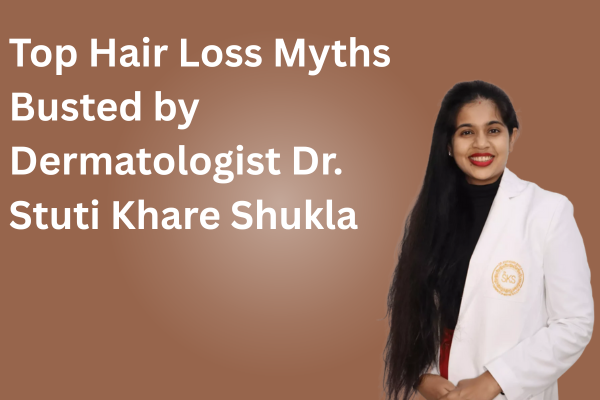Top Hair Loss Myths – Hair loss is surrounded by beliefs—many well-meaning, others misleading. Dr. Stuti Khare Shukla, a leading dermatologist in India, has frequently addressed common myths and offered evidence-based clarity. This post explores the biggest myths about hair loss, why they persist, and what you really should know to protect and strengthen your hair.
Myth 1: Oil makes hair grow faster:-
One of the most persistent beliefs is that regular hair oiling accelerates hair growth exponentially. On her blog Hair Oiling – Ancient Ritual or Modern Mistake?, Dr. Shukla clarifies this myth clearly.
- What people believe: Applying oil increases growth speed by stimulating the scalp, nourishing follicles.
- What Dr. Shukla says: Hair growth is mainly determined by internal factors—genetics, hormones, nutrition, scalp health. Oiling helps with scalp moisture and texture but doesn’t directly speed up growth.
Takeaway: Oil may help with shine, reduce dryness, soothe scalp—but if you depend on it for faster growth alone, you’ll be disappointed.
Myth 2: More oil = better results:-
Another frequent claim: the more often or heavily you oil, the better the effects.
- Popular belief: If light oiling is good, heavy or frequent oiling must be better.
- Dr. Shukla’s insight: Over-oiling can cause problems—clogged pores, buildup, dirt accumulation, even irritation. It may counteract the benefits by creating a scalp environment that impairs follicle function or hygiene.
Takeaway: Use moderate amounts, not overdo it. Frequent light or moderate oiling is far more helpful than heavy greasing.
Myth 3: Leaving oil overnight is best:-
Many believe that leaving oil in hair overnight gives maximum benefit. Dr. Shukla tests this belief and finds risks.
- Claim: Overnight oiling gives more time for absorption, deeper nourishment.
- Reality: Extended oil application without proper cleansing can trap sweat, dust, debris. Overnight residue can increase risk of buildup, irritation, fungal or bacterial issues.
Takeaway: Keep oil on for a few hours (2-3), then cleanse. Overnight may be tempting but may not be beneficial or safe in all cases.
Myth 4: Oiling suits all hair types:-
Some think that because oiling is traditional, it’s universally good for everyone—regardless of scalp type, texture, hair condition.
- Common idea: Oil is natural, so it’s harmless and helpful for everyone.
- What Dr. Shukla points out: Scalp types vary—some have oily scalps, sensitive skin, acne, dandruff. For such people, frequent or heavy oiling can worsen those issues. Hair texture also matters: fine hair may get weighed down.
Takeaway: Tailor oiling to your hair/scalp type. What helps one person may be harmful to another.
Myth 5: Keratin treatments solve hair fall:-
Many people think keratin smoothing or similar treatments reduce hair fall or prevent thinning.
- What supporters say: These treatments reduce frizz, make hair look smoother, hence less breakage → less visible hair fall.
- Dr. Shukla’s observation: While smoothing might improve appearance and reduce breakage due to tangling, it does not fundamentally alter follicle health or stop pattern hair loss. Some treatments involve chemicals that may have their own adverse effects.
Takeaway: Use smoothing treatments cautiously. They may help with aesthetics and manageability, but they are not a cure-for hair loss.
Myth 6: Natural or herbal always equals safe and effective:-
Another widespread myth is that “if it’s natural, it can’t harm; herbal remedies can fix anything.”
- Belief: Herbal shampoos, ayurvedic oils, “no harsh chemicals” always better.
- Dr. Shukla’s balance: Natural ingredients can help with mild issues—moisture, scalp comfort, some mild shedding—but they may not be enough for genetic hair loss, hormonal loss, or advanced thinning. “Natural” also doesn’t always mean evidence-based.
Takeaway: Natural can be helpful, but combine with proven treatments and evaluate results critically.
Myth 7: Hair loss means you must eventually undergo surgery:-
Many assume that if hair starts thinning or balding, surgery is inevitable. Dr. Shukla’s program emphasizes non-surgical routes.
- Popular assumption: Surgery is the only permanent solution for visible bald spots or receding hair line.
- What Dr. Shukla shows: Treatments like the SKS Hair Growth Booster®, along with early action, scalp care, nutrition, correcting hormonal / lifestyle factors, often prevent or delay the need for surgery.
Takeaway: Surgery is one option—but not always essential, especially with early intervention and consistent non-surgical care.
Myth 8: You’ll see dramatic results overnight:-
People often expect fast fixes—overnight transformations following just one treatment or product.
- Belief: Use an oil, herbal remedy, or treatment once, and hair will look thick, lose-fall free next day.
- Clinical reality: Hair growth is a slow biological cycle. Visible improvements (less shedding, more shine, density) commonly show over weeks to months.
Takeaway: Be realistic about timeframe—expect gradual change, not instant miracles.
Myth 9: Hair growth treatments only need to be used once:-
Another variant: use something once or for a short period and expect it to keep working without maintenance.
- Assumption: After initial treatment, the results will sustain indefinitely.
- Dr. Shukla’s advice: Maintenance is critical—consistent follow-ups, proper home care (shampoos, conditioners, nutrition), periodic revisits. Without maintenance, gains may taper off.
Takeaway: Treatments need ongoing support and aftercare for durable results.
Myth 10: If it worked for someone else, it will work exactly for me:-
Comparing ours to others is natural, but hair loss is deeply individual.
- Common thought: A treatment that worked for a friend, family, or influencer will have the same effect.
- Dr. Shukla’s perspective: Every person’s hair loss has unique contributing factors—genetics, scalp health, diet, hormonal balance, stress, etc. One size rarely fits all. Personalized diagnosis and tailoring are central to her approach.
Takeaway: Use testimonials for insight, not guarantees. Seek individualized care.
How to Distinguish Myths from Facts?
Dr. Shukla suggests several strategies:
- Check scientific backing – Look for clinical data, peer-reviewed research, FDA-approval etc.
- Evaluate source – Be wary of marketing hype, sponsored content versus medical blogs.
- Observe scalp and internal health – Pay attention to shedding patterns, texture changes, nutrition etc.
- Track over time – Document progress with images every few weeks to see real changes.
- Consult a dermatologist – Trusted experts like Dr. Stuti can offer diagnosis and treatment regimens tailored to your case.
Dr. Stuti Khare Shukla Contact Information
Social Media Links:-
More Ways to Contact:-
Top Hair Loss Myths Conclusion
Beliefs and myths about hair loss are everywhere, but as Dr. Stuti Khare Shukla shows through her clinical practice and her blogs, separating myth from fact is essential for effective care. Understanding what actually works—evaluated by science, personalized care, consistency—is far more useful than circulating myths.
If you’re dealing with hair loss or thinning, don’t trust just what “everyone says.” Seek reliable, dermatologist-led advice. Dr. Stuti Khare Shukla’s methods emphasize evidence, early care, and tailored treatment—and bust myths so you can focus on what truly restores your hair.
Top Hair Loss Myths FAQs
Q1: Does oil alone ever stop hair loss?
A: Oil can help with moisture and reduce breakage, but it doesn’t stop hair loss caused by genetic or hormonal factors.
Q2: Are natural treatments always safer?
A: Not always—natural products can cause sensitivity or imbalance in some scalps. Always patch test.
Q3: Can smoothing or keratin-based hair care reduce shedding long term?
A: They may reduce visible tangling, but long-term shedding often relates to deeper scalp / follicular health, which requires targeted treatments.
Q4: If I start seeing results, can I stop the treatment?
A: Usually not. Discontinuation often leads to reversal of gains unless maintenance protocols are followed.
Q5: How long before believing that a myth is false?
A: If after consistent, recommended treatment of 8-12 weeks you haven’t seen any improvement (less shedding, more density or improved quality), it’s time to reassess.
Related Tags:-
- best hair doctor in India
- hair growth queen of India
- dermatologist for hair growth
- best hair treatment in Mumbai
- non surgical treatment for hair loss
- Hair Growth Booster®
- Awards and Achievements
- Best Hair Fall Treatments in India
- Hair Transplant
- Hair Transplant vs. Hair Growth Booster®
- How to Stop Hair Loss in Women Naturally
- Top 5 Causes of Sudden Hair Loss
- Hair Growth Results
- Teenage Hair Fall Treated Without Surgery
- Dry Hair After Wash
- Keratin Treatment
- The Dark Side of Daily Heat Styling
- Coloured + Damaged Hair
- Hair Oiling
- Hair Colouring Safe
- SKS Hair Growth Booster
- Hair Transplant vs. SKS Hair Growth Booster
- Balding or Thinning
- Real People Real Results
- Treatment At Home
- Best Dermatologist for Hair Growth in India
- Non-Surgical Hair Regrowth Solutions
- Patients Avoid Hair Transplant Surgery
- Top Hair Loss Myths

